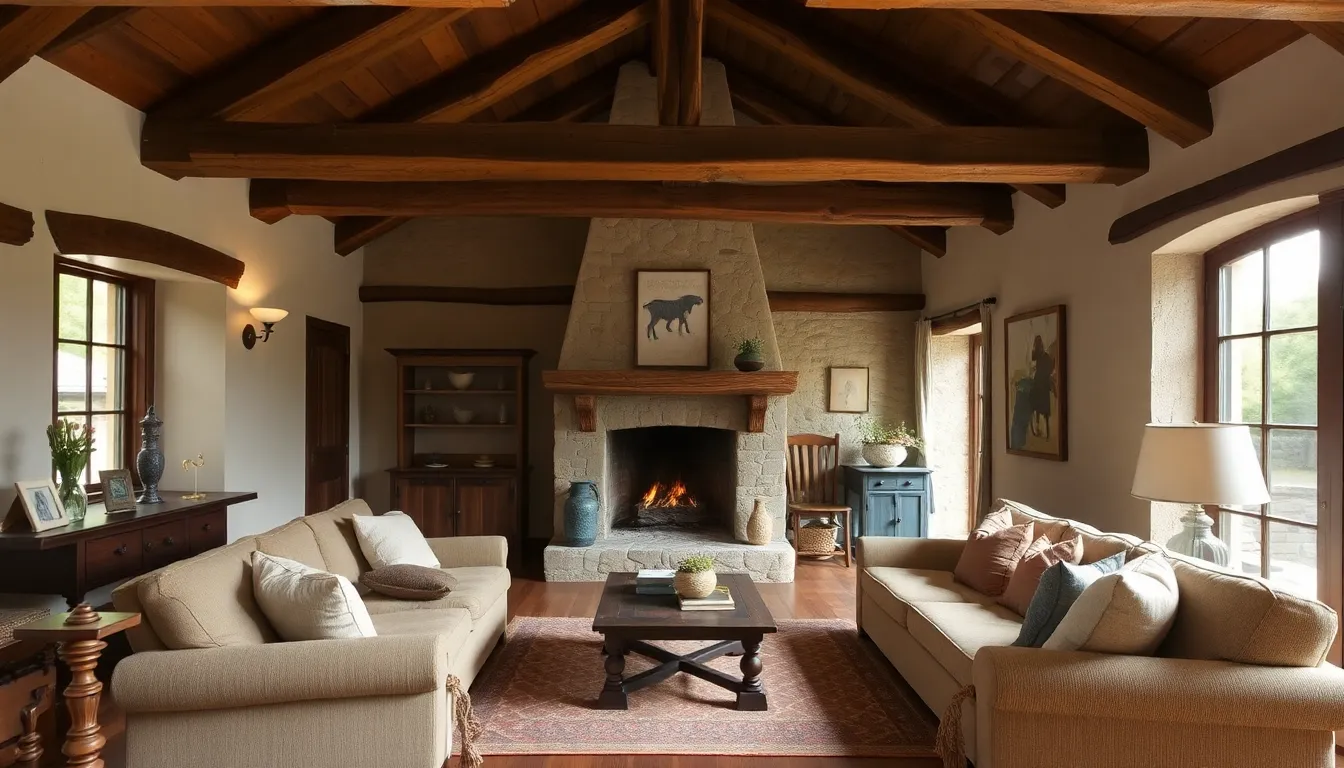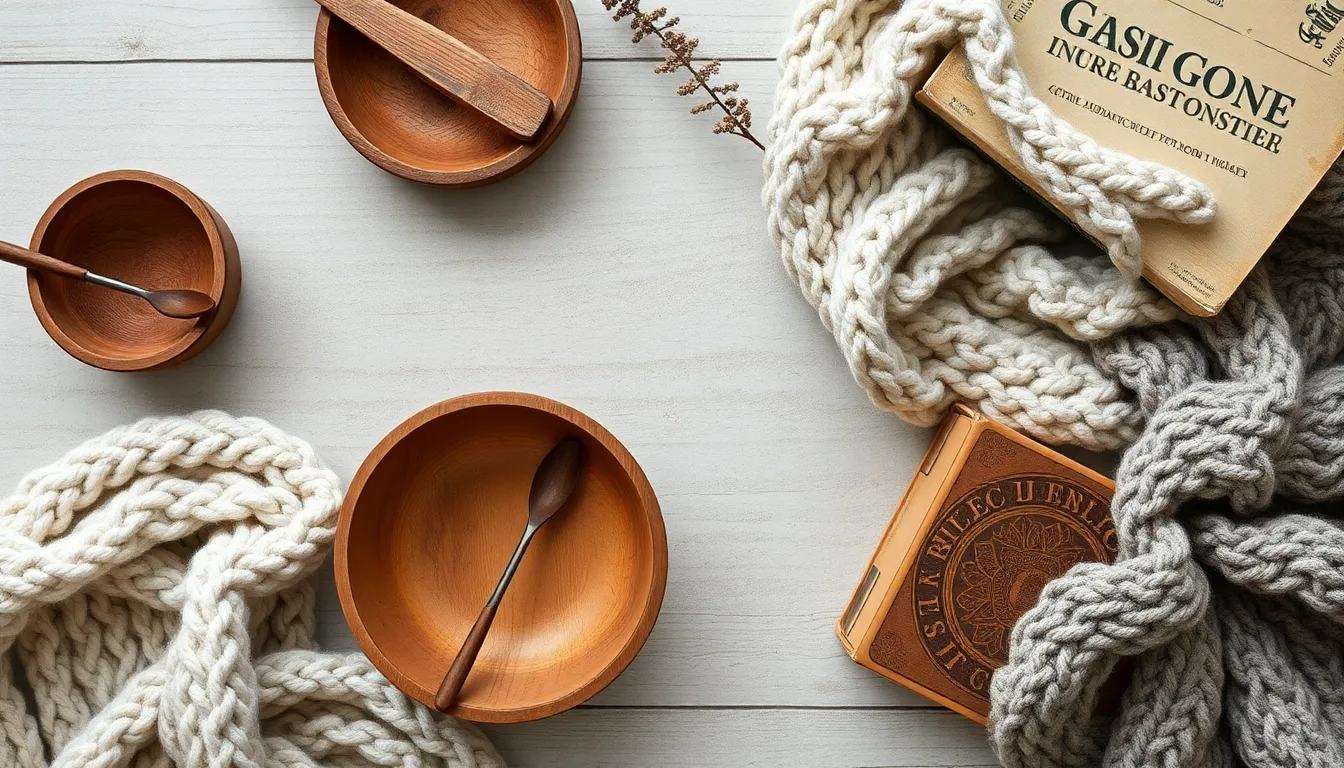Rustic Interior Design: Create a Warm and Cozy Home with Decoratly 🏡🌲
Discover the charm and warmth of rustic interior design. Learn about key elements, color palettes, and how to achieve a cozy, nature-inspired space in your home with Decoratly. Explore the latest trends and expert tips for creating a stunning rustic interior.
The Essence of Rustic Interior Design 🌟
Rustic interior design is a style that embraces the beauty of natural materials, rugged textures, and a connection to the outdoors. It's characterized by warmth, simplicity, and a focus on creating cozy, inviting spaces that feel like a retreat from the modern world. This design approach celebrates imperfections, highlighting the raw beauty of wood, stone, and other natural elements.
Unlike more polished styles, rustic design embraces a lived-in, weathered look that tells a story of time and craftsmanship. It's a versatile approach that can range from rugged cabin aesthetics to more refined country chic, always maintaining a strong connection to nature and traditional craftsmanship.

Key Elements of Rustic Interior Design 🗝️
- Natural materials: Wood, stone, and leather 🌳
- Earthy color palette: Browns, greens, and warm neutrals 🎨
- Exposed architectural elements: Wooden beams and stone walls 🏠
- Handcrafted furniture: Pieces with a focus on craftsmanship and durability 🪑
- Textured fabrics: Wool, burlap, and other natural fibers 🧵
- Vintage and antique accents: Items with history and character 🕰️
- Nature-inspired decor: Animal motifs, botanical prints, and outdoor elements 🦌
- Warm, ambient lighting: Wrought iron fixtures and candlelight 🕯️
- Cozy textiles: Chunky knit throws and sheepskin rugs 🧶
- Organic shapes: Irregular, imperfect forms that mimic nature 🍃
The Evolution of Rustic Design: A Brief History 📜
Rustic design has deep roots in human history, evolving from necessity to a cherished aesthetic. Let's explore its journey:
- Ancient times: Early humans used natural materials out of necessity, creating simple, functional spaces.
- Middle Ages: Rustic elements were prominent in rural cottages and castles, with a focus on durability and function.
- 19th century: The Arts and Crafts movement celebrated handcrafted items, influencing rustic design.
- Early 20th century: Rustic design gained popularity in vacation homes and lodges, emphasizing a connection to nature.
- Mid-20th century: The style evolved to include more refined elements, blending with other design trends.
- Late 20th-21st century: Rustic design sees a resurgence, with a focus on sustainability and a desire to reconnect with nature.
This evolution showcases how rustic design adapts to changing lifestyles while maintaining its core principles of natural beauty and craftsmanship.
Creating a Rustic Interior: Step-by-Step Guide 🏡
Transform your space into a rustic retreat with these steps:
- Start with natural materials: Incorporate wood flooring, stone accents, or exposed brick.
- Choose a warm color palette: Use earthy tones and warm neutrals for walls and large surfaces.
- Add architectural interest: Install wooden beams or a stone fireplace for rustic charm.
- Select rustic furniture: Choose pieces made from reclaimed wood or with a distressed finish.
- Layer textures: Incorporate wool throws, leather upholstery, and woven baskets.
- Bring in vintage elements: Add antique pieces or repurposed items for character.
- Use natural textiles: Opt for linen curtains, burlap accents, and cotton or wool rugs.
- Incorporate nature-inspired decor: Display botanical prints, antlers, or rustic pottery.
- Focus on ambient lighting: Use wrought iron chandeliers, lanterns, and plenty of candles.
- Add greenery: Bring in potted plants or dried flowers to enhance the connection to nature.

Rustic Color Palettes: Creating Warmth and Comfort 🎨
The color palette is crucial in rustic interior design. It typically consists of:
- Base colors: Warm browns, tans, and creamy whites form the foundation.
- Accent colors: Deep reds, forest greens, and golden yellows add depth and interest.
- Natural hues: Earthy tones inspired by nature, such as sage green, terracotta, and sky blue.
The key is to create a warm, inviting atmosphere that reflects the colors found in nature. The earthy base provides a cozy backdrop, while carefully chosen accent colors add character and visual interest.
Furniture and Materials in Rustic Design 🪑
Furniture plays a crucial role in defining rustic interiors. Here are some key characteristics and popular materials:
Furniture Characteristics:
- Sturdy, solid construction
- Distressed or weathered finishes
- Simple, functional designs
- Handcrafted or artisanal qualities
- Emphasis on natural beauty and imperfections
Popular Materials:
- Wood: Reclaimed, barn wood, or rough-hewn timber
- Stone: For flooring, fireplaces, or accent walls
- Leather: Aged or distressed for upholstery
- Metal: Wrought iron or copper accents
- Natural fibers: Jute, sisal, or wool for textiles
When selecting furniture, focus on pieces that showcase natural materials and craftsmanship. Look for items that tell a story and contribute to the overall warm, lived-in feel of rustic design.
Lighting in Rustic Interior Design 💡
Lighting plays a crucial role in creating the warm, inviting atmosphere of rustic interiors. Here's how to approach lighting in a rustic-inspired space:
- Natural light: Maximize sunlight with simple window treatments or bare windows.
- Wrought iron fixtures: Use chandeliers or pendant lights with a rustic, handcrafted look.
- Warm bulbs: Choose bulbs with a warm color temperature to create a cozy glow.
- Lantern-style lighting: Incorporate wall-mounted or tabletop lanterns for ambiance.
- Candlelight: Use plenty of candles in rustic holders or mason jars.
- Task lighting: Add table lamps with wooden or ceramic bases for functional light.
Remember, in rustic design, lighting should create a soft, warm glow that enhances the cozy atmosphere of the space.
Incorporating Modern Elements in Rustic Design 🔄
While rustic design celebrates traditional elements, it can also incorporate modern touches for a fresh, updated look. Here are some ways to blend contemporary features into your rustic space:
- Sleek appliances: Choose modern kitchen appliances in stainless steel or matte black.
- Contemporary artwork: Mix modern art pieces with more traditional rustic decor.
- Clean-lined furniture: Incorporate some furniture with simpler, more modern silhouettes.
- Updated lighting: Use modern pendant lights or floor lamps alongside rustic fixtures.
- Smart home technology: Integrate modern tech discreetly into your rustic space.
The key is to strike a balance between rustic charm and modern convenience, creating a space that feels both timeless and current.
Sustainable Practices in Rustic Interior Design ♻️
Sustainability aligns perfectly with the rustic ethos of using natural materials and honoring craftsmanship. Here are some eco-friendly approaches to consider:
- Reclaimed materials: Use reclaimed wood for flooring, furniture, or accent pieces.
- Vintage and antique items: Incorporate second-hand or antique furniture and decor.
- Local artisans: Support local craftspeople for custom furniture and decor items.
- Natural fibers: Choose organic cotton, wool, or linen for textiles.
- Low-VOC finishes: Use eco-friendly paints and wood stains.
- Energy efficiency: Incorporate energy-efficient appliances and lighting.
By embracing these sustainable practices, you can create a rustic-inspired space that's not only beautiful and cozy but also environmentally responsible.
Create Your Dream Rustic Space with Decoratly! 🏡🌲
Ready to embrace the warm and inviting charm of rustic interior design? Sign up for Decoratly today and start transforming your living space into a cozy natural retreat! Our platform offers a carefully curated selection of rustic-inspired furniture, decor, and accessories, making it easy to achieve that perfect blend of rugged charm and modern comfort. Plus, our expert designers are here to provide guidance and inspiration every step of the way.
